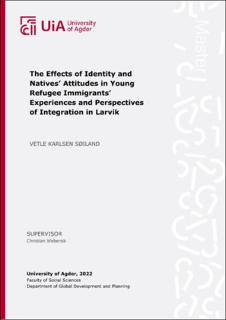| dc.description.abstract | The ongoing global refugee crisis has brought urgency to questions related to how integration of refugee immigrants should be approached in order to produce desirable social and economic outcomes, both for the immigrants and for the communities in which they arrive. Considering the complexity of identities in integration processes, and the significance of different attitudes towards refugee immigrants, sociocultural aspects of integration require elaborate examination - particularly from the perspective of immigrants themselves. Therefore, this study explores young refugee immigrants’ experiences of integration in Larvik, with specific attention to the roles of identity formation and perceptions of natives’ attitudes. The main objective of the study is to present suggestions as to how young refugee immigrants’ voices and experiences of integration can be incorporated into narratives and policies of integration.
A qualitative research design guided by interpretivist and constructivist positions has been utilized in order to address the research problem and research questions, and to fulfill the research objective. Empirical findings are presented as a result of a thematic analysis of primary data collected through participant observation and semi-structured interviews with young refugee immigrants situated in Larvik, Norway.
Key findings indicate that both the national identity and young refugee immigrants’ own cultural and ethnic backgrounds have played crucial roles in their experiences of integration, and that it must be seen as decisive for their well-being to be able to establish and maintain connections to both. By expressing signs of positive and welcoming attitudes, the majority population can lower the informal bar for what it takes to become a part of larger society, enable promotion and acceptance of ethnic diversity and thus enhance the benefits of identifying with more than one cultural background. Based on these findings, this study suggests an increased focus on highlighting positive aspects of immigration and integration, facilitating cultural exchange and raising awareness among young refugee immigrants on the benefits of being multicultural in integration policies, initiatives and narratives. | |
